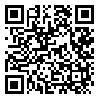Volume 5, Issue 1 (2025)
jpt 2025, 5(1): 109-120 |
Back to browse issues page
Download citation:
BibTeX | RIS | EndNote | Medlars | ProCite | Reference Manager | RefWorks
Send citation to:



BibTeX | RIS | EndNote | Medlars | ProCite | Reference Manager | RefWorks
Send citation to:
Zarvandi J, Lezgi A, Farsian K. Plantinga and Al-Ghazali; Compatibility of Science and Religious Beliefs. jpt 2025; 5 (1) :109-120
URL: http://jpt.modares.ac.ir/article-34-79720-en.html
URL: http://jpt.modares.ac.ir/article-34-79720-en.html
1- Department of Theology, Faculty of Basic Sciences, Shahid Satari University, Tehran, Iran
2- Department of Theology, Faculty of Theology, Imam Ali University, Tehran, Iran
3- Department of Philosophy, Wisdom and Logic, Faculty of Humanities, Tarbiat Modares University, Tehran, Iran
2- Department of Theology, Faculty of Theology, Imam Ali University, Tehran, Iran
3- Department of Philosophy, Wisdom and Logic, Faculty of Humanities, Tarbiat Modares University, Tehran, Iran
Abstract: (516 Views)
Atheists often believe that modern science supports their viewpoint. Some claim that the metaphysical basis of contemporary science leaves no room for religious beliefs, asserting a fundamental incompatibility between science and theism. However, some philosophers argue that this claim is misguided and that there are compelling reasons to see a profound compatibility between theism and science. In this paper, we will demonstrate, based on Alvin Plantinga's epistemology on one hand and Al-Ghazali's hermeneutic theory on the other, that not only is there no serious conflict between science and theistic beliefs, but we can also view them as interdependent.
Article Type: Original Research |
Subject:
Philosophy of Religion (Modern)
Received: 2025/01/28 | Accepted: 2025/03/8 | Published: 2025/03/15
Received: 2025/01/28 | Accepted: 2025/03/8 | Published: 2025/03/15
References
1. Al-Ghazali AH (1904). AL-MUSTASFÂ MIN 'ILM AL-USÛL. Boulaq: AL-MATBA'A AL-AMÎRIYYA. [Arabic] [Link]
2. Al-Ghazali AH (1993). QANUN AL-TA'WIL. Beirut: DAR AL-KOTOB AL-ILMIYAH. [Arabic] [Link]
3. Al-Ghazali AH (2002). FAYSAL AL-TAFRIQA BAYNA L-ISLÂM WA-L-ZANDAQA. Cairo: DÂR IHYÂ AL-KOTOB AL-'ARABÎYYA. [Arabic] [Link]
4. Farabi AN (1985). Al-Farabi on the perfect state (MABĀDIʼ ĀRĀʼ AHL AL-MADĪNAT AL-FĀḌILAH). Walzer R, editor. Oxford: Clarendon Press. [Link]
5. Helm P (1998). John Calvin, the sensus divinitatis, and the noetic effects of sin. International Journal for Philosophy of Religion. 43(2):87-107. [Link]
6. Hoseini Shahroodi SM, Mashhadi T (2011). Rational interpretation of religion from the perspective of Tabatabai and Ghazali. Comparative Theology. 2(6):1-18. [Persian] [Link]
7. McGinnis J, Acar R (2023). Arabic and Islamic philosophy of religion. Zalta EN, Nodelman U, editors. Stanford: Stanford Encyclopedia of Philosophy. [Link]
8. Nagel T (2023). Analytic philosophy and human life. New York: Oxford University Press. [Link] [DOI:10.1093/oso/9780197681671.001.0001]
9. Plantinga A (1993). Warrant and proper function. Oxford: Oxford University Press. [Link] [DOI:10.1093/0195078640.001.0001]
10. Plantinga A (1996). Science: Augustinian or Duhemian?. Faith and Philosophy. 13(3):368-394. [Link] [DOI:10.5840/faithphil19961335]
11. Plantinga A (2000). Warranted Christian belief. Oxford: Oxford University Press. [Link] [DOI:10.1093/0195131932.001.0001]
12. Plantinga A (2011). Where the conflict really lies: Science, religion, and naturalism. New York: Oxford University Press. [Link] [DOI:10.1093/acprof:oso/9780199812097.001.0001]
13. Stroumsa S (1999). Freethinkers of medieval Islam: Ibn al-Rawāndī, Abū Bakr al-Rāzī, and their impact on Islamic thought. Leiden: Brill. [Link] [DOI:10.1163/9789004452848]
| Rights and permissions | |
 |
This work is licensed under a Creative Commons Attribution-NonCommercial 4.0 International License. |






